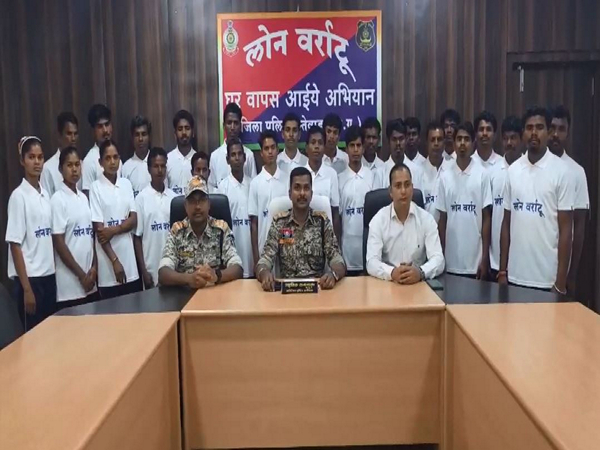
Symbiosis Law School, Pune Hosts the 8th Edition of SLSP Conclave 2025
Apr 07, 2025
SMPL
Pune (Maharashtra) [India], April 7: Symbiosis Law School, Pune (SLSP), a constituent of Symbiosis International University, successfully organized the 8th edition of its flagship event, SLSP Conclave 2025, on April 4, 2025, at the Ishanya Auditorium, Viman Nagar, Pune. The event focused on the theme "Navigating the Intersection of AI and Healthcare: Legal, Ethical, and Policy Challenges in India" and was conducted in collaboration with the Scheme for Promotion of Academic and Research Collaboration (SPARC), under Ministry of Education, Government of India.
The Chief Guest, Justice Tarlok Singh Chauhan, Judge of the Himachal Pradesh High Court, delivered a thought-provoking speech. Drawing from his personal experiences, Justice Chauhan highlighted the potential risks of unregulated AI in healthcare and stressed the need for a balanced approach to its adoption. He expressed his excitement about the upcoming panel discussion and emphasized the importance of addressing the perils of unbridled AI use in the healthcare industry.
The keynote address was delivered by Dr. Rajiv Yeravdekar, Provost, Faculty of Medical and Health Sciences, Symbiosis International (Deemed University). Dr. Yeravdekar introduced his original concept of the "syndrome of phenomenology" and provided deep insights into the challenges and opportunities presented by AI in the healthcare sector. His address delved into the complexities of integrating AI into healthcare systems while ensuring ethical and effective implementation.
Prof. (Dr.) Shashikala Gurpur, Fulbright Scholar, Director of Symbiosis Law School, Pune, and Dean, Faculty of Law, Symbiosis International (Deemed University), delivered the opening address. Dr. Gurpur, who also serves as the Jean Monnet Chair Professor (EUC-LAMP) and Principal Investigator of the SPARC Project, set the tone for the discussions by emphasizing the importance of ethical and legal frameworks in the integration of AI in healthcare. She also felicitated the Chief Guest, Justice Tarlok Singh Chauhan, and the Keynote Speaker, Dr. Rajiv Yeravdekar, along with the esteemed panellists.
The panel discussion featured a diverse group of experts who shared their perspectives on the theme. Dr. Milind Antani, Leader of Pharma and Life-Sciences Practice at Nishith Desai, discussed the public's mixed opinions on AI in healthcare. He emphasized the importance of accountability, accessibility, and safety, while underscoring the need for human oversight in AI implementation. Dr. Claes Granmar, Associate Professor at Stockholm University, explored the complexities of cross-border data sharing in healthcare. He highlighted the need to balance patient privacy with the compatibility of healthcare systems across nations. Dr. Pavan Duggal, Chairman of the International Commission on Cyber Security Law, provided a localized perspective on the legal challenges in India. He addressed issues such as patient liability, data fiduciary responsibilities, and the critical role of informed consent.
Dr. Alok Kulkarni, Senior Interventional Neuropsychiatrist at Manas Institute of Mental Health and Neurosciences, advocated for a balanced approach that fosters innovation while ensuring accountability, patient safety, and public trust in AI-assisted healthcare. Archit Lohani, Research Group Member at the Center for AI and Digital Policy (CAIDP), highlighted the flaws in AI systems and the prevalence of tech-hesitancy in India. He called for a shift in mindset to embrace AI's potential while addressing its inter-sectional impacts on areas like climate change and insurance. Aditya Patni, Partner at Khaitan & Co., pointed out the lack of regulation in AI-driven healthcare. He stressed the importance of defining clear use cases to ensure ethical and equitable implementation, especially given India's socio-economic divide. Suvajit Chakraborty, Associate General Counsel and Regional Director at Revvity, addressed concerns about the "black-box" nature of AI in healthcare. He emphasized the need for transparency, human oversight, and the mitigation of biases caused by incomplete data.
The event concluded with an engaging Q&A session, where over 15 questions were asked by the audience. Topics ranged from data privacy and patient records to the ethical implications of reproductive care apps. In her concluding remarks, Prof. (Dr.) Shashikala Gurpur reiterated the importance of adhering to ethical standards in the adoption of AI in healthcare. The event concluded with a Vote of Thanks delivered by Dr. Aparajita Mohanty, Deputy Director of Symbiosis Law School, Pune.
The SLSP Conclave 2025 successfully brought together legal, medical, and technological experts to address the pressing challenges at the intersection of AI and healthcare, paving the way for a more informed and ethical future.
(ADVERTORIAL DISCLAIMER: The above press release has been provided by SMPL. ANI will not be responsible in any way for the content of the same)




























